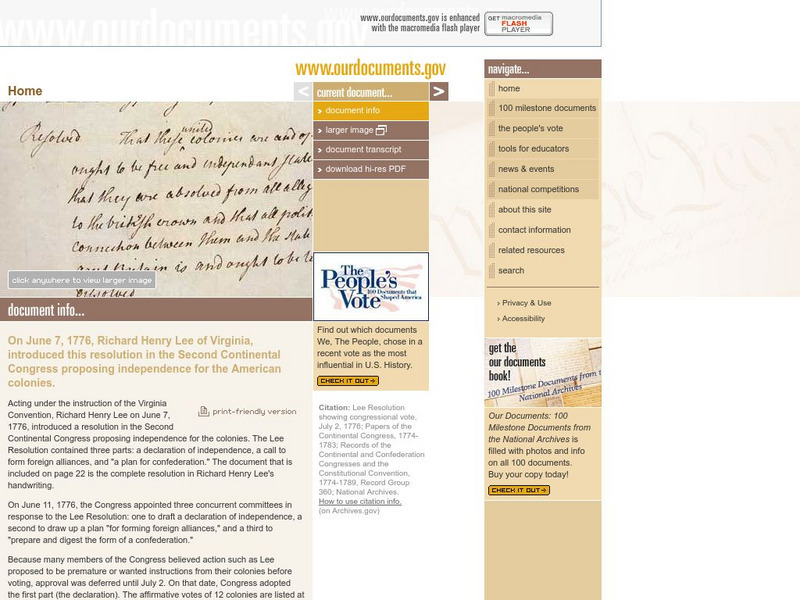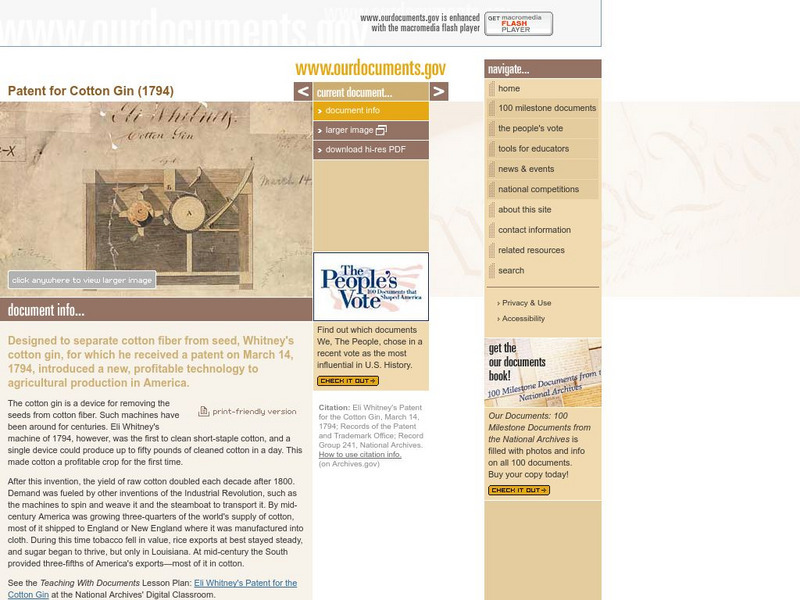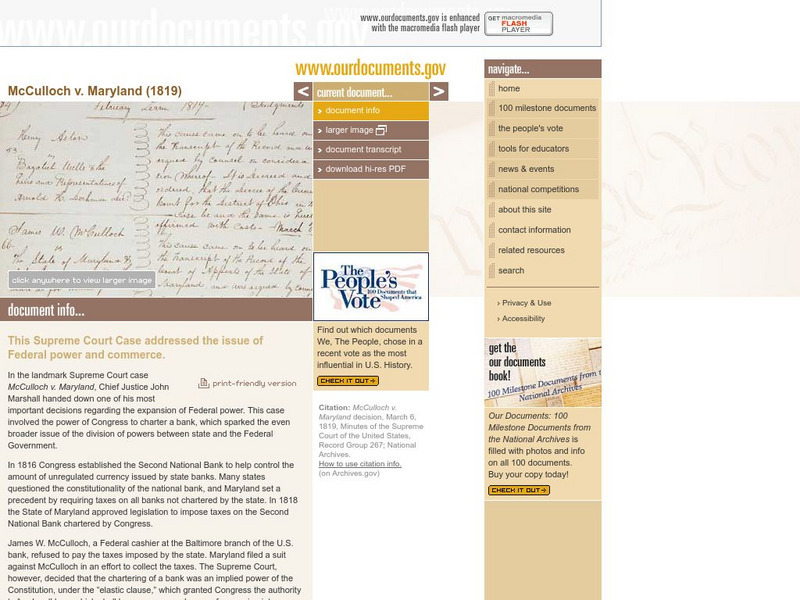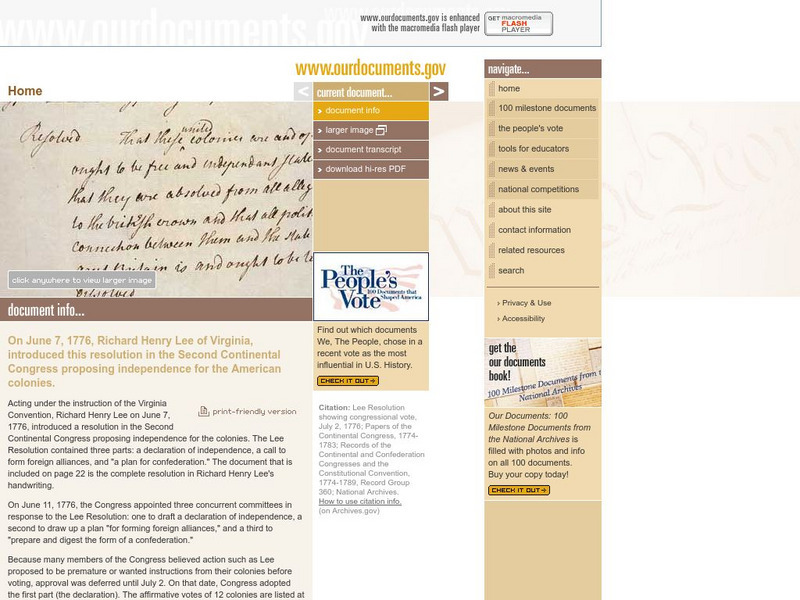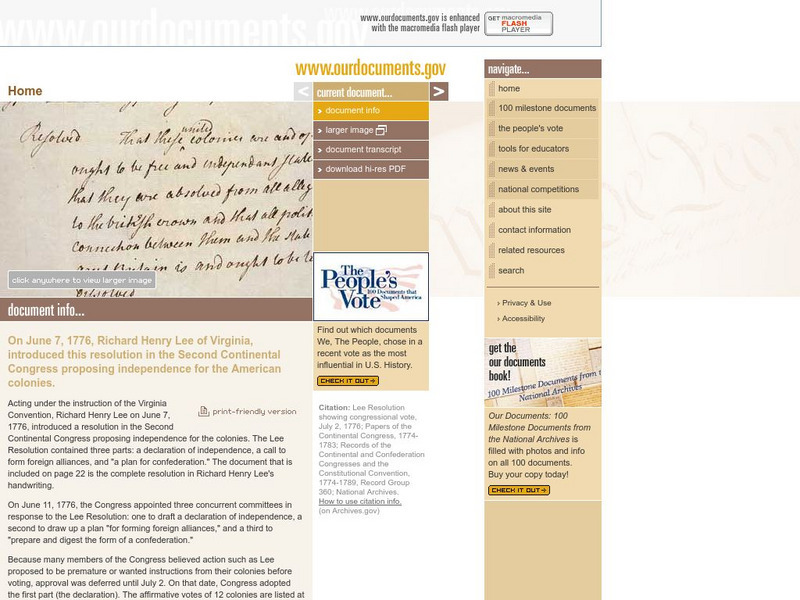US National Archives
Our Documents: Emancipation Proclamation (1863)
Image of handwritten copy of Lincoln's Emancipation Proclamation, accompanied by an explanation of the speech's purpose, impact, and role in American history.
US National Archives
Our Documents: Morrill Act (1862)
Primary document (and transcription) of Morrill Act, which provided land to states to use in the establishment of agricultural colleges.
US National Archives
Our Documents: Homestead Act (1862)
Original text (and transcription) of the 1862 Homestead Act, which granted land for a five-year residence for minimal fees. Accompanied by an overview of the act, including how it both helped and hindered farmers.
US National Archives
Our Documents: Dred Scott v. Sanford (1857)
Learn about the Dred Scott decision and why it changed the course of American history even though many now consider it the worst opinion ever rendered by the U.S. Supreme Court. Includes full-page scans of the decision, a transcription,...
US National Archives
Our Documents: Jefferson's Secret Message to Congress
Read President Thomas Jefferson's secret message to Congress through which he asked for money to explore the West. The 1803 document is accompanied by transcription and overview of its content.
US National Archives
Our Documents: Patent for Cotton Gin (1794)
Interactive image of Eli Whitney's plans for the cotton gin, accompanied by an explanation of the cotton gin's purpose and significance in relation to the Industrial Revolution.
US National Archives
Our Documents: Mc Culloch v. Maryland
Learn about this landmark Supreme Court case on the issues of federal power and commerce. Provides an image of a document from the case files and a transcript of the opinion delivered in 1819 by Chief Justice John Marshall.
US National Archives
Our Documents: Lee Resolution (1776)
The Our Documents group offers information on Richard Henry Lee's 1776 resolution proposing colonial independence. See the original document, read the transcript, and download a printer-friendly version.
US National Archives
Our Documents: Treaty of Alliance With France (1778)
Use this site to learn the history of the 1778 U.S. defensive Treaty of Alliance with France, view images of the document, read a transcript, or download a printer-friendly version.
US National Archives
Our Documents: Great Seal of the United States (1782)
View and learn about the original design of the great seal, including the history of its creation and its current uses.
US National Archives
Our Documents: Social Security Act (1935)
Explanation of the importance of the Social Security Act and how it differed from social security initiatives of European countries. Includes a facsimile of the act's official entry in the Enrolled Acts and Regulations of Congress, along...
US National Archives
Our Documents: National Labor Relations Act (1935)
Explore the original document that established the National Labor Relations Board written in 1935. Also known as the Wagner Act, its intention was to give employees the right to form unions and to engage in collective bargaining.
Globe Tracks
Travel for Kids: Fun Things to Do in Japan
"Kids already know a little about Japan if they collect Pokemon cards or buy Hello Kitty. Japan may seem very "modern," but it has a long history of tradition deeply embedded in everyday life." This site explores the geography and...
US National Archives
Nara: Teaching With Documents: Petition to u.s. Senate
Take a look at a 1917 anti-suffrage petition submitted to Congress by the Anti-Suffrage Party of New York that this site provides from the National Archives and Records Administration (NARA).
US National Archives
Nara: Teaching With Documents: Woman Suffrage and the 19th Amendment/lessons
This National Archives and Records Administration site briefly discusses the background of the 19th Amendment and offers primary sources, activities, and links to related web sited for educators and students.
US National Archives
Nara: The Magna Carta
One of the historical events that led to the creation of the limited government of the United States, the Magna Carta was written in 1215 as a promise from King John of England to his demanding barons. It put English kings under the rule...
US National Archives
Nara: Founding Fathers: North Carolina
Gives biographical details on the five delegates from North Carolina to the Constitutional Convention: William Blount, William Richard Davie, Alexander Martin, Richard Dobbs Spaight Sr., and Hugh Williamson.
US National Archives
Nara: Founding Fathers: New Jersey
Gives biographical details on the five delegates from New Jersey to the Constitutional Convention: David Brearly, Jonathan Dayton, William C. Houston, William Livingston, and William Patterson.
US National Archives
Nara: Founding Fathers: Connecticut
Gives biographical details on the three delegates from Connecticut to the Constitutional Convention: Oliver Ellsworth, William Samuel Johnson, and Roger Sherman.
US National Archives
Nara: Founding Fathers: Massachusetts
Gives biographical details on the four delegates from Massachusetts to the Constitutional Convention: Elbridge Gerry, Nathaniel Gorham, Rufus King, and Caleb Strong.
US National Archives
Nara: Founding Fathers: Pennsylvania
Gives biographical details on the eight delegates from Pennsylvania to the Constitutional Convention: George Clymer, Thomas Fitzsimons, Benjamin Franklin, Jared Ingersoll, Thomas Mifflin, Gouverneur Morris, Robert Morris, and James Wilson.
US National Archives
Nara: Founding Fathers: Delaware
Gives biographical details on the five delegates from Delaware to the Constitutional Convention: Richard Bassett, Gunning Bedford, Jr., Jacob Broom, John Dickinson, and George Read.
US National Archives
Nara: Founding Fathers: Maryland
Gives biographical details on the five delegates from Maryland to the Constitutional Convention: Daniel Carroll, Daniel of St. Thomas Jenifer, Luther Martin, James McHenry, and John Francis Mercer.
US National Archives
Nara: Founding Fathers: Georgia
Gives biographical details on the four delegates from Georgia to the Constitutional Convention: Abraham Baldwin, William Few, William Houston, and William Leigh Pierce.


